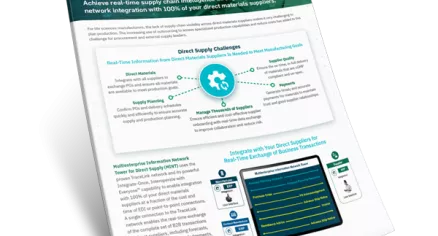green
MINT Overview
A fast, simple, and cost-effective way to integrate with supply chain partners
MINT uses the proven TraceLink network and its powerful Integrate-Once, Interoperate with Everyone™ capability to enable integration with 100% of your supply chain partners at a fraction of the cost and time of alternative methods like EDI or point-to-point models. A single connection to the TraceLink network enables the real-time exchange of purchase orders, invoices, advance ship notices (ASNs), production forecasts, and most other common business transactions.
With TraceLink MINT, you can:
Industry needs
Stay in lockstep with your supply chain partners
TraceLink MINT dramatically increases your supply chain intelligence by enabling cost-effective, real-time integration with 100% of your trading partners, improving visibility into POs, inventory, production forecasts, demand signals, and much more. As a result, your organization is empowered to:
Reduce supply risk
Collaborate with suppliers in real time with the up-to-date information you need to respond to supply chain disruptions.
Reduce supply risk
Reduce excess inventory
More frequent orders in lower quantities with accurate supplier confirmations improves agility and reduces excess inventory needed to cover for inaccurate or outdated information.
Reduce excess inventory
Align manufacturing and logistics operations
Real-time data exchange between manufacturing and logistics improves available-to-promise and ensures fast and efficient order fulfillment.
Align manufacturing and logistics operations
Improve product availability and customer service levels
Integration with all suppliers improves planning and inventory management and ensures the right level of product availability to meet customer demand.
Improve product availability and customer service levels
Industry Voices
Transforming the supply chain
Customers and industry experts explain why supply chain digitization is critical and how TraceLink can help.
Customers and industry experts explain why digital supply chain integration is critical and how TraceLink can help.






















